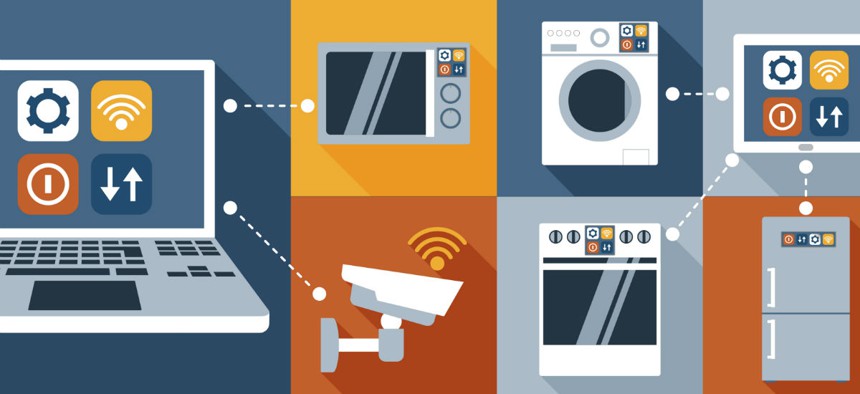Redesigning Government Work for the Internet of Things

Macrovector/Shutterstock.com
The proliferation of Internet-connected devices represents a new way of working.
Max Meyers and Claire Niech are GovLab fellows and senior consultants in Deloitte Consulting LLP’s Strategy and Operations practice. William D. Eggers leads Deloitte’s public sector research and is the author of eight books, including his newest, "The Solution Revolution: How Business, Government, and Social Enterprises are Teaming up to Solve Society’s Toughest Problems."
When television first hit the market, early news shows featured an anchor reading the events of the day from a typed paper in his hand -- treating television as “radio with pictures.” It would take networks years to fully understand the unique potential of visual media to evoke emotion, to “show rather than tell” -- and to develop the new production processes to do so.
Today, computing is undergoing a similar degree of change; the continued evolution toward cheaper processors and faster networks has enabled a shift from desktop workstations to mobile phones and, now, to everyday objects, inspiring the term “Internet of Things.” Almost any device can be Internet-enabled, linking it to additional computing power and analytic capabilities that make it “smart.”
Like with television, the IoT ultimately represents a new way of working, one where -- as Kevin Ashton, who coined “Internet of Things,” describes -- machines and other devices supplant humans as the primary means of collecting, processing and interpreting information. This shift breaks many of the constraints that have traditionally defined how work is done -- and makes redesigning work a priority for organizations.
In fact, in Deloitte’s 2015 Global Human Capital survey of more than 3,000 executives worldwide, roughly 60 percent rated the issue of “machines as talent” as “important” or “very important” -- yet only 5 percent believe they have a detailed understanding of how to address it.
In this sense, the IoT is not simply a cool new wave of tech-enabled luxuries like sport sensors or connected appliances; it’s an inflection point in how we do work, structure businesses. and govern the resulting economy and society. To effectively and efficiently deliver public services in this shifting reality, government must be not an observer but an active participant.
So how exactly might the IoT impact the delivery of government services?
Here are three ways agencies can redesign work to derive value from the IoT: eliminating routine tasks, enhancing employee capabilities and engaging a community of mission partners.
Eliminate routine tasks. By letting sensor-enabled machines handle routine tasks, workers can focus their limited time and energy on high-yield activities and tough problems.
In government, many regulatory agencies, for example, are already considering how to automate measurement and allow regulators to focus on analysis and enforcement. The U.S. Geological Survey employs sensors to remotely monitor the bacterial levels of rivers and lakes, and the General Services Administration has begun using sensors to measure and verify the energy efficiency of “green” buildings.
And fields like education present an opportunity to radically extend this idea, relieving teachers of some of the administrative burden in classroom procedures like taking roll or distributing materials.
A smartband like those used to check in at theme parks might log attendance, for example, or beacons might distribute assignments to student devices. As a result, teachers can focus on student learning needs and differentiating instruction -- the hard work of teaching.
Enhance workers’ capabilities. What were once imaginative toys for a tech-savvy spy like Hollywood’s James Bond may soon be a new class of tools for public servants more generally.
Real-time insights from IoT devices can help agency employees work “smarter,” targeting their effort more precisely or tracking actions or tasks to improve performance.
For police, for example, wearables could supplement body cameras by providing insight into police officers’ behaviors -- enabling both real-time support and long-term coaching.
Connected firearms offer the opportunity to track location, when the weapon is removed from its holster, and when it is discharged. In the moment, pulling or firing the weapon can dispatch additional support, while over time, the record can inform coaching and development discussions.
Stress levels, heart rate, or voice volume might provide similar benefits -- with particularly powerful implications in an era where local police are increasingly tapped for crowd control or longer incident response.
Engage a community of partners. The IoT also enables governments to document real-time conditions -- and communicate these conditions to a wide swath of stakeholders. A simple example is New York City’s initiative to transform public pay phones into Internet-connected pylons that could someday broadcast emergency messages or offer places to provide civic feedback.
But this capability is even more powerful for agencies or localities tasked with tough, multidimensional problems like water security in drought-plagued areas like California or the plains above the Ogallalla. Sensors might help detect water flow to help utilities prioritize repairs or even alert homeowners to leaky pipes, increasing yield. Recording and analyzing use over time can help users lower demand – especially when compared to neighbors.
Wirelessly connected devices that measure soil conditions can help automate use for high-volume applications like irrigation. A single set of conservation solutions from one set of these players might not be enough to move the needle, but the IoT makes it possible to coordinate and track a combined, ecosystem response.
As governments work to deliver quality services in increasingly complex environments, devices that have already begun to make life easier and more efficient for companies and consumers can also help create greater public value. Government leaders should start exploring the IoT not by examining new gadgets, but by looking at the core work of their agency and asking what business processes might benefit from eliminating tasks, enhancing capabilities or better engaging partners.
(Image via Macrovector/Shutterstock.com)





